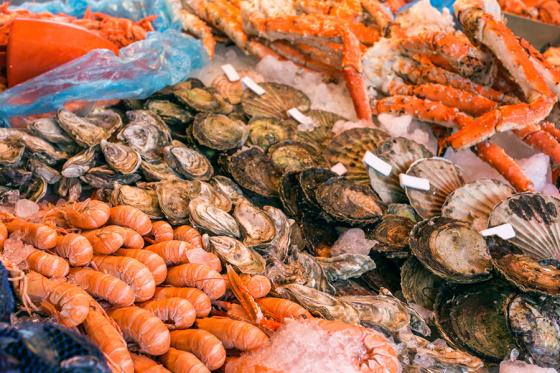In bid for Trump trade deal, EU turns to shellfish from soybeans
The European Union hopes to achieve a big breakthrough in transatlantic trade relations with small fry.
Faced with a U.S. refusal to cut industrial tariffs unless the EU opens its agricultural market more, the European Commission might be prepared to scale back technical barriers to imports of American foods including shellfish, according to officials. They spoke on the condition of anonymity because the plan is still under discussion.

The idea is that the bloc would recognize U.S. safety standards for mollusks as equivalent to Europe’s rules, opening the door to American shipments of edibles such as oysters to the European market.
The offer is being weighed in connection with Ursula von der Leyen’s first planned visit to Washington as head of the European Commission, the EU’s executive arm, for talks with President Donald Trump.
Von der Leyen and Trump agreed at a meeting in Davos, Switzerland, last week to discuss transatlantic commerce in the U.S. capital next month and her visit could take place as soon as the week of Feb. 3. Meanwhile, U.S. Agriculture Secretary Sonny Perdue is scheduled to meet EU Trade Commissioner Phil Hogan on Monday in Brussels, and to take part in a working lunch with farm ministers from the bloc.
The EU aims to renew a July 2018 truce that has been fraying in recent months as the U.S. targeted Europe with new tariffs or warnings of them. Chief among Europe’s worries is a lingering U.S. threat to hit EU cars and auto parts with duties based on national-security grounds.
The deal a year and a half ago was reached between Trump and von der Leyen’s predecessor, Jean-Claude Juncker. Both sides pledged to try to scale back barriers to trade in industrial goods and avoid a repeat of tit-for-tat tariffs that began with controversial U.S. duties on European steel and aluminum as a result of security arguments.
The pact also included EU pledges to import more U.S. soybeans and liquefied natural gas.
Red Lines
Negotiations to slash industrial duties across the board—the centerpiece of the 2018 agreement—have yet to start because the Trump administration has insisted that agriculture be included in the scope of the talks.
The von der Leyen-led commission, in office since Dec. 1, has no intention of ceding to this American demand, which would require a new negotiating mandate from EU governments.
Including European farm tariffs in any market-opening deliberations with the U.S. is a no-go for the EU unless the Trump administration crosses a red line of its own by agreeing to discuss the opening of American public procurement and maritime services.
Also off limits for the bloc are its longstanding bans on hormone-treated beef and on “chlorinated” chicken and the European approval process—slow and unpredictable—for genetically modified foods. These three matters have long irked the U.S.
It is in this context that von der Leyen’s commission is scrambling to meet American demands for better access to the European agri-food market. The commission wants to be able to deliver something concrete to the Trump administration and avoid triggering a political battle with EU national governments.
That explains Hogan’s recent description of the goal as plucking “low-hanging fruit.” But, in a sign that even here Europe won’t be a pushover, Hogan has listed as an example a U.S. refusal to allow imports of European apples and pears.
“There might be two or three issues where we can agree,” Hogan, who was previously the EU’s farm chief, told reporters in Washington on Jan. 16. “If we work together on these, I think that we can find a different type of mechanism to find solutions to these agricultural issues without having the European Union or the United States going looking for a new mandate for negotiations. It’s the speedier way.”
Similar Stories
United States and Norway issue innovative report creating greater transparency in critical mineral supply chains
Today, the U.S. Department of Commerce and the Norwegian Ministry of Trade, Industry, and Fisheries issued a thorough, innovative report presenting our shared understanding of non-market policies and practices (NMPPs)…
View ArticleDecember CNBC/NRF retail monitor results show strong growth boosted by final Thanksgiving weekend days
Retail sales jumped strongly in December, boosted in part by two busy holiday shopping days during Thanksgiving weekend falling in the final month of the year, according to the CNBC/NRF…
View ArticleNAW presents Dirk Van Dongen Lifetime Achievement Award to Bergman, CEO of Henry Schein, Inc.
At the 2025 NAW Executive Summit Gala on January 28 in Washington, D.C.
View Article
St. Louis region’s chemical industry welcomes new investment
View Article
Navigating compliance: Adapting to changing Customs regulations in global supply chains
View Article
December 2024 U.S. Transportation Sector Unemployment (4.3%) Was the Same As the December 2023 Level (4.3%) And Above the Pre-Pandemic December 2019 Level (2.8%)
View ArticleGet the most up-to-date trending news!
SubscribeIndustry updates and weekly newsletter direct to your inbox!





